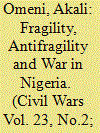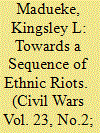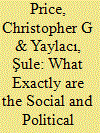| Srl | Item |
| 1 |
ID:
181096


|
|
|
|
|
| Summary/Abstract |
The article covers the topic of limitations to the territoriality of Daesh affiliates. As attempt to establish territorial Caliphate, these units should demonstrate high levels of territoriality but empirically speaking this is not the case. The article presents the territorial spread of the groups and maps possible limitations that would explain this paradox. It concludes that unlike other territorial violent non-state actors, Daesh affiliates are incapable of utilising liquidity thus are stuck in an environment that presents them with opposition from all sides. It is thus improbable that the Daesh affiliates will ever show important territorial spread.
|
|
|
|
|
|
|
|
|
|
|
|
|
|
|
|
| 2 |
ID:
181098


|
|
|
|
|
| Summary/Abstract |
Fifty years after the Biafra war, its discourse in public sphere remains dominant as though the war just ended. Existing studies attribute this to several factors, including perceived marginalisation and collective victimhood of the Igbo (that is, the people of South-East, Nigeria) and the failure of Nigerian state to pursue the post-Biafra war peace-building initiatives. Although research has used framing perspective to explain why Biafra separatist agitators have remained non-violent despite organised provocations, the impact of Biafra war documentaries on continual resurgence of secessionist agitations is yet to be given adequate attention in literature. Thus, this article provides empirical evidence of how documentaries of Biafra war fuel secessionist agitations among the Igbo by helping the movement gain more converts. Using a mixed-methods approach, the paper argues that constant (re)distribution of Biafra war documentaries in the social and other media draws more supporters to secessionist agitations. The implication is that until Nigerian government counters the narratives contained in these documentaries by visibly implementing the post-Biafra war peace-building initiatives, the secessionist agitations will likely continue to gain momentum.
|
|
|
|
|
|
|
|
|
|
|
|
|
|
|
|
| 3 |
ID:
181100


|
|
|
|
|
| Summary/Abstract |
Governments may resort to a wide range of economic policies to generate revenue and compensate certain sectors in civil wars. Such measures block market access and hurt the interests of third-party countries operating in this market, giving the latter an incentive to shape the course of events in the conflict. To empirically demonstrate this argument, I look at changes in tariff rates adopted by civil war governments to restrict international trade during conflict. I find strong empirical evidence that external actors consider economic interventions on behalf of the government to meet the demand for revenue and for a return to more liberal policies.
|
|
|
|
|
|
|
|
|
|
|
|
|
|
|
|
| 4 |
ID:
181095


|
|
|
|
|
| Summary/Abstract |
Focusing on Biafra’s calculus of war to shed new light on the rebel-side debate, this article revisits the Civil War of Nigeria (1967–1970) to extract campaign lessons for the Nigerian Army (NA) in its fight against Boko Haram (BH). The paper uses Nassim Taleb’s ‘antifragility’ theory to explain why Biafra rebels crumbled under traditional military campaign stressors imposed on them. By contrast, Boko Haram’s ‘antifragile’ threat has grown, even as campaign stressors imposed by the NA increased. Embracing the differences in operational environment within both conflicts, this article reflects on the implications of BH’s antifragility for the NA’s counter-insurgency (COIN).
|
|
|
|
|
|
|
|
|
|
|
|
|
|
|
|
| 5 |
ID:
181097


|
|
|
|
|
| Summary/Abstract |
While research on interstate rivalries is abundant, scholarship examining nonstate rivalries remains limited. To address this shortcoming, in this article we introduce the Armed Nonstate Actor Rivalry Dataset (ANARD) – a dataset which captures dyadic rivalries and militarised disputes among armed nonstate actors in the Middle East and North Africa (MENA) between 1993 and 2018. We begin by explaining why fine-grained data on militarised interactions between armed nonstate organisations are needed for a comprehensive understanding of conflict. We then provide details of the data collection process and coding practices. Finally, we identify the contributions that ANARD can make to conflict research.
|
|
|
|
|
|
|
|
|
|
|
|
|
|
|
|
| 6 |
ID:
181099


|
|
|
|
|
| Summary/Abstract |
Ethnic riots are not as unstructured as the literature suggests. There is a clear sequence of events through which violence erupts. This article explains four stages of the build-up to deadly clashes: the triggering incident; the spread of rumours; the emergence of armed mobs; their interaction and the eruption of violence. Drawing on extensive ethnographic fieldwork in Jos, Nigeria, the article identifies the mechanisms that define each stage and argues that they need to happen for mass violence to occur. The conclusion reflects on the findings’ theoretical implications as well as their relevance for violence prevention and peacebuilding.
|
|
|
|
|
|
|
|
|
|
|
|
|
|
|
|
| 7 |
ID:
181101


|
|
|
|
|
| Summary/Abstract |
The last decade has seen a proliferation of studies on the consequences of civil wars; yet, we are far from reaching a consensus about what wars leave behind. In this review, we summarise findings from recent scholarship on four areas of importance for post-war politics: civic attitudes, prosocial behaviours, political participation and partisanship. We summarise findings, and suggest ways to answer contradictory or conflicting findings in the existing research by comparing across different literatures. We identify weaknesses in methods and measurement, and provide clear suggestions for future research, particularly calling for greater attention to wartime dynamics, measurement, and mechanisms.
|
|
|
|
|
|
|
|
|
|
|
|
|
|
|
|